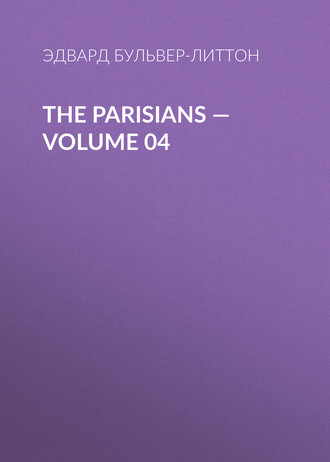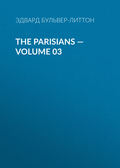
Эдвард Бульвер-Литтон
The Parisians — Volume 04
"They were not prosaic; and they were kind and very wise," she added, with her exquisite laugh,—laugh so wonderfully sweet and musical. She now had gained the entrance of the arbour; Graham joined her, and they walked towards the house. He asked her if she had seen much of the Savarins since they had met.
"Once or twice we have been there of an evening."
"And encountered, no doubt, the illustrious young minstrel who despises Tasso and Corneille?"
"M. Rameau? Oh, yes; he is constantly at the Savarins. Do not be severe on him. He is unhappy, he is struggling, he is soured. An artist has thorns in his path which lookers-on do not heed."
"All people have thorns in their path, and I have no great respect for those who want lookers-on to heed them whenever they are scratched. But M. Rameau seems to me one of those writers very common nowadays, in France and even in England; writers who have never read anything worth studying, and are, of course, presumptuous in proportion to their ignorance. I should not have thought an artist like yourself could have recognized an artist in a M. Rameau who despises Tasso without knowing Italian."
Graham spoke bitterly; he was once more jealous.
"Are you not an artist yourself? Are you not a writer? M. Savarin told me you were a distinguished man of letters."
"M. Savarin flatters me too much. I am not an artist, and I have a great dislike to that word as it is now hackneyed and vulgarized in England and in France. A cook calls himself an artist; a tailor does the same; a man writes a gaudy melodrame, a spasmodic song, a sensational novel, and straightway he calls Himself an artist, and indulges in a pedantic jargon about 'essence' and 'form,' assuring us that a poet we can understand wants essence, and a poet we can scan wants form. Thank heaven, I am not vain enough to call myself artist. I have written some very dry lucubrations in periodicals, chiefly political, or critical upon other subjects than art. But why, a propos of M. Rameau, did you ask me that question respecting myself?"
"Because much in your conversation," answered Isaura, in rather a mournful tone, "made me suppose you had more sympathies with art and its cultivators than you cared to avow; and if you had such sympathies, you would comprehend what a relief it is to a poor aspirant to art like myself to come into communication with those who devote themselves to any art distinct from the common pursuits of the world, what a relief it is to escape from the ordinary talk of society. There is a sort of instinctive freemasonry among us, including masters and disciples; and one art has a fellowship with other arts. Mine is but song and music, yet I feel attracted towards a sculptor, a painter, a romance-writer, a poet, as much as towards a singer, a musician. Do you understand why I cannot contemn M. Rameau as you do? I differ from his tastes in literature; I do not much admire such of his writings as I have read; I grant that he overestimates his own genius, whatever that be,—yet I like to converse with him. He is a struggler upwards, though with weak wings, or with erring footsteps, like myself."
"Mademoiselle," said Graham, earnestly, "I cannot say how I thank you for this candour. Do not condemn me for abusing it, if—" he paused.
"If what?"
"If I, so much older than yourself,—I do not say only in years, but in the experience of life, I whose lot is cast among those busy and 'positive' pursuits, which necessarily quicken that unromantic faculty called common-sense,—if, I say, the deep interest with which you must inspire all whom you admit into an acquaintance even as unfamiliar as that now between us makes me utter one caution, such as might be uttered by a friend or brother. Beware of those artistic sympathies which you so touchingly confess; beware how, in the great events of life, you allow fancy to misguide your reason. In choosing friends on whom to rely, separate the artist from the human being. Judge of the human being for what it is in itself. Do not worship the face on the waters, blind to the image on the rock. In one word, never see in an artist like a M. Rameau the human being to whom you could intrust the destinies of your life. Pardon me, pardon me; we may meet little hereafter, but you are a creature so utterly new to me, so wholly unlike any woman I have ever before encountered and admired, and to me seem endowed with such wealth of mind and soul, exposed to such hazard, that—that—" again he paused, and his voice trembled as he concluded—"that it would be a deep sorrow to me if, perhaps years hence, I should have to say, 'Alas'! by what mistake has that wealth been wasted!'"
While they had thus conversed, mechanically they had turned away from the house, and were again standing before the arbour.
Graham, absorbed in the passion of his adjuration, had not till now looked into the face of the companion by his side. Now, when he had concluded, and heard no reply, he bent down and saw that Isaura was weeping silently.
His heart smote him.
"Forgive me," he exclaimed, drawing her hand into his; "I have had no right to talk thus; but it was not from want of respect; it was— it was—"
The hand which was yielded to his pressed it gently, timidly, chastely.
"Forgive!" murmured Isaura; "do you think that I, an orphan, have never longed for a friend who would speak to me thus?" And so saying, she lifted her eyes, streaming still, to his bended countenance,—eyes, despite their tears, so clear in their innocent limpid beauty, so ingenuous, so frank, so virgin-like, so unlike the eyes of 'any other woman he had encountered and admired.'
"Alas!" he said, in quick and hurried accents, "you may remember, when we have before conversed, how I, though so uncultured in your art, still recognized its beautiful influence upon human breasts; how I sought to combat your own depreciation of its rank among the elevating agencies of humanity; how, too, I said that no man could venture to ask you to renounce the boards, the lamps,—resign the fame of actress, of singer. Well, now that you accord to me the title of friend, now that you so touchingly remind me that you are an orphan, thinking of all the perils the young and the beautiful of your sex must encounter when they abandon private life for public, I think that a true friend might put the question, 'Can you resign the fame of actress, of singer?'"
"I will answer you frankly. The profession which once seemed to me so alluring began to lose its charms in my eyes some months ago. It was your words, very eloquently expressed, on the ennobling effects of music and song upon a popular audience, that counteracted the growing distaste to rendering up my whole life to the vocation of the stage; but now I think I should feel grateful to the friend whose advice interpreted the voice of my own heart, and bade me relinquish the career of actress."
Graham's face grew radiant. But whatever might have been his reply was arrested; voices and footsteps were heard behind. He turned round and saw the Venosta, the Savarins, and Gustave Rameau.
Isaura heard and saw also, started in a sort of alarmed confusion, and then instinctively retreated towards the arbour. Graham hurried on to meet the Signora and the visitors, giving time to Isaura to compose herself by arresting them in the pathway with conventional salutations.
A few minutes later Isaura joined them, and there was talk to which Graham scarcely listened, though he shared in it by abstracted monosyllables. He declined going into the house, and took leave at the gate. In parting, his eyes fixed themselves on Isaura. Gustave Rameau was by her side. That nosegay which had been left in the arbour was in her hand; and though she was bending over it, she did not now pluck and scatter the rose-leaves. Graham at that moment felt no jealousy of the fair-faced young poet beside her.
As he walked slowly back, he muttered to himself, "But am I yet in the position to hold myself wholly free? Am I, am I? Were the sole choice before me that between her and ambition and wealth, how soon it would be made! Ambition has no prize equal to the heart of such a woman; wealth no sources of joy equal to the treasures of her love."
CHAPTER III
FROM ISAURA CICOGNA TO MADAME DE GRANTMESNIL
The day after I posted my last, Mr. Vane called on us. I was in our little garden at the time. Our conversation was brief, and soon interrupted by visitors,—the Savarins and M. Rameau. I long for your answer. I wonder how he impressed you, if you have met him; how he would impress, if you met him now. To me he is so different from all others; and I scarcely know why his words ring in my ears, and his image rests in my thoughts. It is strange altogether; for though he is young, he speaks to me as if he were so much older than I,—so kindly, so tenderly, yet as if I were a child, and much as the dear Maestro might do, if he thought I needed caution or counsel. Do not fancy, Eulalie, that there is any danger of my deceiving myself as to the nature of such interest as he may take in me. Oh, no! There is a gulf between us there which he does not lose sight of, and which we could not pass. How, indeed, I could interest him at all, I cannot guess. A rich, high-born Englishman, intent on political life; practical, prosaic—no, not prosaic; but still with the kind of sense which does not admit into its range of vision that world of dreams which is familiar as their daily home to Romance and to Art. It has always seemed to me that for love, love such as I conceive it, there must be a deep and constant sympathy between two persons,—not, indeed, in the usual and ordinary trifles of taste and sentiment, but in those essentials which form the root of character, and branch out in all the leaves and blooms that expand to the sunshine and shrink from the cold,—that the worldling should wed the worldling, the artist the artist. Can the realist and the idealist blend together, and hold together till death and beyond death? If not, can there be true love between them?
By true love, I mean the love which interpenetrates the soul, and once given can never die. Oh, Eulalie, answer me, answer!
P. S.—I have now fully made up my mind to renounce all thought of the stage.
FROM MADAME DE GRANTMESNIL TOISAURA CICOGNA
MY DEAR CHILD,—how your mind has grown since you left me, the sanguine and aspiring votary of an art which, of all arts, brings the most immediate reward to a successful cultivator, and is in itself so divine in its immediate effects upon human souls! Who shall say what may be the after-results of those effects which the waiters on posterity presume to despise because they are immediate? A dull man, to whose mind a ray of that vague starlight undetected in the atmosphere of workday life has never yet travelled; to whom the philosopher, the preacher, the poet appeal in vain,—nay, to whom the conceptions of the grandest master of instrumental music are incomprehensible; to whom Beethoven unlocks no portal in heaven; to whom Rossini has no mysteries on earth unsolved by the critics of the pit,—suddenly hears the human voice of the human singer, and at the sound of that voice the walls which enclosed him fall. The something far from and beyond the routine of his commonplace existence becomes known to him. He of himself, poor man, can make nothing of it. He cannot put it down on paper, and say the next morning, "I am an inch nearer to heaven than I was last night;" but the feeling that he is an inch nearer to heaven abides with him. Unconsciously he is gentler, he is less earthly, and, in being nearer to heaven, he is stronger for earth. You singers do not seem to me to understand that you have—to use your own word, so much in vogue that it has become abused and trite—a mission! When you talk of missions, from whom comes the mission? Not from men. If there be a mission from man to men, it must be appointed from on high.
Think of all this; and in being faithful to your art, be true to yourself. If you feel divided between that art and the art of the writer, and acknowledge the first to be too exacting to admit a rival, keep to that in which you are sure to excel. Alas, my fair child! do not imagine that we writers feel a happiness in our pursuits and aims more complete than that which you can command. If we care for fame (and, to be frank, we all do), that fame does not come up before us face to face, a real, visible, palpable form, as it does to the singer, to the actress. I grant that it may be more enduring, but an endurance on the length of which we dare not reckon. A writer cannot be sure of immortality till his language itself be dead; and then he has but a share in an uncertain lottery. Nothing but fragments remains of the Phrynichus who rivalled AEschylus; of the Agathon who perhaps excelled Euripides; of the Alcaeus, in whom Horace acknowledged a master and a model; their renown is not in their works, it is but in their names. And, after all, the names of singers and actors last perhaps as long. Greece retains the name of Polus, Rome of Roscius, England of Garrick, France of Talma, Italy of Pasta, more lastingly than posterity is likely to retain mine. You address to me a question, which I have often put to myself,—"What is the distinction between the writer and the reader, when the reader says, 'These are my thoughts, these are my feelings; the writer has stolen them, and clothed them in his own words'?" And the more the reader says this, the more wide is the audience, the more genuine the renown, and, paradox though it seems, the more consummate the originality, of the writer. But no, it is not the mere gift of expression, it is not the mere craft of the pen, it is not the mere taste in arrangement of word and cadence, which thus enables the one to interpret the mind, the heart, the soul of the many. It is a power breathed into him as he lay in his cradle, and a power that gathered around itself, as he grew up, all the influences he acquired, whether from observation of external nature, or from study of men and books, or from that experience of daily life which varies with every human being. No education could make two intellects exactly alike, as no culture can make two leaves exactly alike. How truly you describe the sense of dissatisfaction which every writer of superior genius communicates to his admirers! how truly do you feel that the greater is the dissatisfaction in proportion to the writer's genius, and the admirer's conception of it! But that is the mystery which makes —let me borrow a German phrase—the cloud-land between the finite and the infinite. The greatest philosopher, intent on the secrets of Nature, feels that dissatisfaction in Nature herself. The finite cannot reduce into logic and criticism the infinite.
Let us dismiss these matters, which perplex the reason, and approach that which touches the heart, which in your case, my child, touches the heart of woman. You speak of love, and deem that the love which lasts—the household, the conjugal love—should be based upon such sympathies of pursuit that the artist should wed the artist.
This is one of the questions you do well to address to me; for whether from my own experience, or from that which I have gained from observation extended over a wide range of life, and quickened and intensified by the class of writing that I cultivate, and which necessitates a calm study of the passions, I am an authority on such subjects, better than most women can be. And alas, my child, I come to this result: there is no prescribing to men or to women whom to select, whom to refuse. I cannot refute the axiom of the ancient poet, "In love there is no wherefore." But there is a time—it is often but a moment of time—in which love is not yet a master, in which we can say, "I will love, I will not love."
Now, if I could find you in such a moment, I would say to you, "Artist, do not love, do not marry, an artist." Two artistic natures rarely combine. The artistic nature is wonderfully exacting. I fear it is supremely egotistical,—so jealously sensitive that it writhes at the touch of a rival. Racine was the happiest of husbands; his wife adored his genius, but could not understand his plays. Would Racine have been happy if he had married a Corneille in petticoats? I who speak have loved an artist, certainly equal to myself. I am sure that he loved me. That sympathy in pursuits of which you speak drew us together, and became very soon the cause of antipathy. To both of us the endeavour to coalesce was misery.
I don't know your M. Rameau. Savarin has sent me some of his writings; from these I judge that his only chance of happiness would be to marry a commonplace woman, with separation de biens. He is, believe me, but one of the many with whom New Paris abounds, who because they have the infirmities of genius imagine they have its strength.
I come next to the Englishman. I see how serious is your questioning about him. You not only regard him as a being distinct from the crowd of a salon; he stands equally apart in the chamber of your thoughts,—you do not mention him in the same letter as that which treats of Rameau and Savarin. He has become already an image not to be lightly mixed up with others. You would rather not have mentioned him at all to me, but you could not resist it. The interest you feel in him so perplexed you, that in a kind of feverish impatience you cry out to me, "Can you solve the riddle? Did you ever know well Englishmen? Can an Englishman be understood out of his island?" etc. Yes, I have known well many Englishmen; in affairs of the heart they are much like all other men. No; I do not know this Englishman in particular, nor any one of his name.
Well, my child, let us frankly grant that this foreigner has gained some hold on your thoughts, on your fancy, perhaps also on your heart. Do not fear that he will love you less enduringly, or that you will become alienated from him, because he is not an artist. If he be a strong nature, and with some great purpose in life, your ambition will fuse itself in his; and knowing you as I do, I believe you would make an excellent wife to an Englishman whom you honoured as well as loved; and sorry though I should be that you relinquished the singer's fame, I should be consoled in thinking you safe in the woman's best sphere,— a contented home, safe from calumny, safe from gossip. I never had that home; and there has been no part in my author's life in which I would not have given all the celebrity it won for the obscure commonplace of such woman-lot. Could I move human beings as pawns on a chessboard, I should indeed say that the most suitable and congenial mate for you, for a woman of sentiment and genius, would be a well-born and well-educated German; for such a German unites, with domestic habits and a strong sense of family ties, a romance of sentiment, a love of art, a predisposition towards the poetic side of life, which is very rare among Englishmen of the same class. But as the German is not forthcoming, I give my vote for the Englishman, provided only you love him. Ah, child, be sure of that. Do not mistake fancy for love. All women do not require love in marriage, but without it that which is best and highest in you would wither and die. Write to me often and tell me all. M. Savarin is right. My book is no longer my companion. It is gone from me, and I am once more alone in the world.
Yours affectionately.
P. S.—Is not your postscript a woman's? Does it not require a woman's postscript in reply? You say in yours that you have fully made up your mind to renounce all thoughts of the stage. I ask in mine, "What has the Englishman to do with that determination?"







